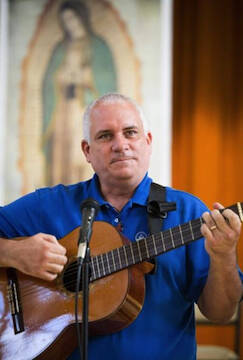Training of pastoral leaders and provision of most other resources for Hispanic ministry are not keeping up with the fast-approaching time when Hispanics will make up the majority of Catholics in the United States, according to a new report. “Hispanic Catholics have reached critical mass in the church,” said Hosffman Ospino, lead author of the National Study of Catholic Parishes with Hispanic Ministry. He said 55 percent of all U.S. Catholics under the age of 30 are Hispanic, and Hispanics account for 71 percent of the growth in the U.S. Catholic population since 1960. “Ignoring the growth of Hispanic Catholics in the United States would be self-defeating for our churches and schools,” he added. Ospino, assistant professor of theology and ministry at Boston College, presented his findings from the first major survey of how parishes are handling the rapid demographic shift on May 5 at the college. Hispanics currently account for about 40 percent of all U.S. Catholics.
Church Must Increase Hispanic Ministry
Show Comments ()
2
Comments are automatically closed two weeks after an article's initial publication. See our comments policy for more.
Mike Evans
11 years 2 months ago
Hispanic ministry in most parishes entails creating two separate worshiping communities divided by language and devotional traditions. The use of part-time or even full time priests of Spanish origin also results in divisiveness from a country other than Mexico and even different segments of Mexico itself. Language, idiom and local cultures differ greatly, much more so than differences among typical American congregations. In the past we had many immigrant variations of ethnic parishes, Italian, Polish, German, and the ubiquitous Irish who were dominant. Over time, assimulation worked and most parishes retained their ethnic origins while opening up to welcome all. Today, we satisfy the need for Hispanic ministry mostly with priests imported from Spanish-speaking countries, with only a few bilingual local priests. As the Hispanic community matures, the second and third generation begins to lose its Hispanic language skills and only seems to retain its devotions and other ethnic customs. They are otherwise fully integrated by their experiences in jobs, professions, schooling, commerce and community living. While they may be 40% or more of our parishes now, only a much smaller group remains significantly limited in language skills. As one of our immigrant ladies remarked, 'when the Mass was in Latin we were all equally mystified.' Today's Hispanic youth are mostly illiterate in the Spanish language yet are often found at Hispanic liturgies for the sake of family harmony and general familiarity with the devotional side of worship. They do not comprehend the readings, nor the prayers themselves, and one wonders what they glean from the homilies and music. The American church has a lot of work to do to continue to assimulate this ethnic group. With assimulation will come vocations and the far greater result of people of Hispanic origin ministered to by 'one of their own.'
Rick Sherman
11 years 2 months ago
Mike Evans makes some great points. I have been doing 'Hispanic ministry' for 14 years and I think we are over thinking it at this point. Hispanics and everyone else need to understand our place in salvation history going back to Abraham. The more we recognize the major events in this story and how they relate to us in our own age, the more we see our common identity and can actually practice our faith rather than celebrate our ethnic roots wherever they 'originate'. The language issues do indeed work themselves out within a generation or two. Pop culture and economic incentives are very powerful. We can just have quarterly international food festivals where ethnic groups can dress up and sing and dance in their given tradition and enjoy the cuisine. Everyone likes to eat and try new foods. Liturgical music can be argued out like it is in most parish settings. Some people are better at collaboration than others, but we don't need to reduce everything to ethnic conflict.
In my humble opinion, the biggest improvements in parish and Church life will come by merely raising our expectations about what constitutes meaningful formation in our modern age.
The latest from america
Los Angeles Archbishop José H. Gomez was one of several community leaders who joined to open the Family Assistance Program, aiding those affected by recent ICE raids.
On Friday, Pope Leo XIV issued a statement on the theme "Migrants, missionaries of hope."
In Steven Spielberg’s “Close Encounters of the Third Kind,” an ordinary electrician has a transcendent encounter—with U.F.O.s, not God.
Many of my acquaintances have given up “reading about something that didn't happen.” But fiction has long-term and concrete value, both mentally and socially.








